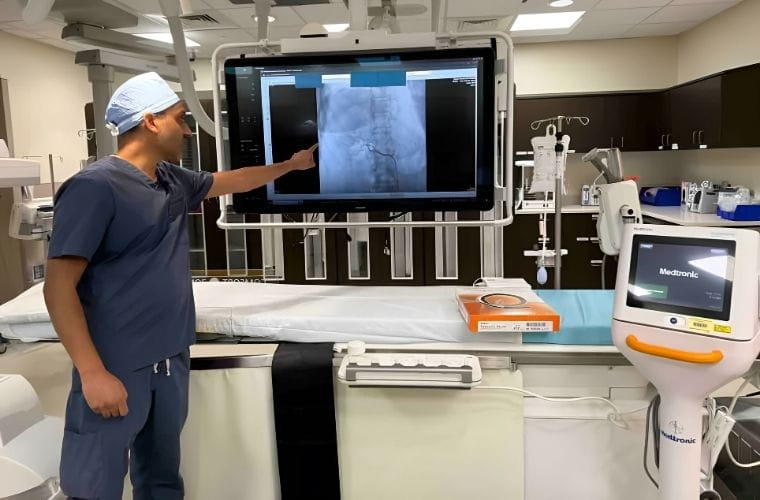Innovative Procedure to Control High Blood Pressure Shows Exciting Results

For more than a year, Ruth Rettig lived in a state of anxiety, with blood pressure that skyrocketed out of the blue. She was well aware that it could have dire consequences, like heart attack or stroke.
Fast forward to today, and those fears have been allayed, and her blood pressure is well controlled. The difference? Last September, Rettig underwent a new procedure called renal denervation (RDN), performed by BayCare Medical Group Interventional Cardiologist Parag Patel, MD, at Mease Countryside Hospital.
Both patient and doctor are thrilled with the results.
“Before the procedure she had extremely uncontrolled blood pressure even though she was taking five medications,’’ Dr. Patel said. “Now her blood pressure is consistently under control despite taking fewer medications (three) at lower doses.’’
Blood pressure is considered high if it’s more than 130 (systolic) over 80 (diastolic) in adults. At Rettig’s highest, her systolic was 190. Combinations of medications had only brought it down to the 140-160 range, still of great concern. Since the renal denervation, Dr. Patel said her blood pressure has consistently been less than 130 over 80.
The innovative procedure targets nerves near the kidneys that can become overactive and cause elevated blood pressure. During the minimally invasive procedure, the doctor inserts a very thin tube into the renal arteries and applies thermal energy to disrupt the nerves. The tube is removed, leaving no implant behind. The patient is under mild sedation during the procedure and is expected to go home on the same day.
“I’m definitely glad I did it; I’m grateful to Dr. Patel for suggesting it,’’ said Rettig, who is 70. “I’m feeling really good. I feel healthier. It’s like a relief, something taken off your shoulders.’’
The reduction in blood pressure after renal denervation varies by patient, but Dr. Patel said even modest drops can have beneficial clinical effect. Generally, after about a month, patients should know the result of the procedure. Long-term studies have shown durable results, and many patients continue to have a gradual decline in blood pressure.
Rettig has followed up with Dr. Patel every three months since the procedure. She’s hopeful of having even more medications reduced, she said. “My energy is good, and I’m starting to work out with weights, which I didn’t do before. I’m going to the gym and walking and getting some strength back in my legs.’’

High blood pressure is a common condition. According to the Centers for Disease Control and Prevention, nearly half of all adults in the United States have high blood pressure and only about one in four have it under control.
The prevalence of the condition makes this innovative new solution all the more compelling.
“It’s very exciting,’’ said Jennifer Sullivan, Director of Cardiovascular Services/West Region. “We see the effects of uncontrollable blood pressure – the heart attacks, the strokes. By better controlling blood pressure, this procedure could have a significant impact in the management and treatment of cardiovascular disease. We are proud to offer this to the people of Tampa Bay and to expand our services.”
For more information on services and procedures offered through BayCare’s Heart and Vascular Institute, visit the Heart and Vascular Institute page.
